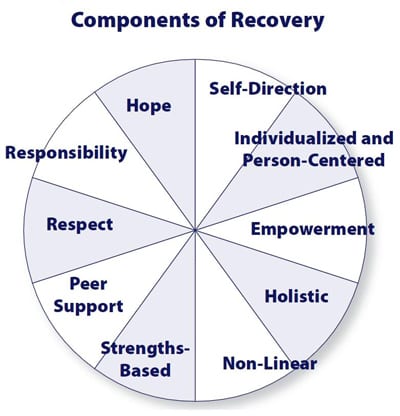I recently read an article written by a person who is tired of people like me talking about recovery from psychiatric disorders. She wanted us to “stop talking about recovery and start using a more useful and less stigmatizing word: hope.” I am not sure what she wants us to have hope of. Stabilization? Maintenance? Better medication? Better therapy? My hope is that I can have a full and meaningful life despite the fact that I have bipolar disorder, mild PTSD, panic attacks and an eating disorder. The state of Arizona determined that I have a serious mental illness and I take five medications. I have had serious episodes of depression throughout my life, been hospitalized twice for ten days each, and spent fifteen years of the last seventeen years with a thought of self-harm every day and serious suicidal thoughts a couple times a year.
I went through a period when I had no hope. It was right after I was hospitalized almost 18 years ago for ten days because I was suicidal. I spent three of those days in the psych hospital’s ICU. When I got out, I did research online and learned that if a person has recurring episodes of depression that they will continue, become closer together and more severe. My goose was cooked. My fate was sealed. I would always struggle with depression. I had a chronic condition and no one mentioned that recovery was possible. No one then spoke of recovery or expecting very much from life.
Then I met a person who was my age who had my diagnosis who was doing better than I was, and for the first time I had hope – hope that I could get better, hope that recovery was possible. I am not talking about a cure. Recovery is not a cure nor does it happen overnight. Sometimes it can be very gradual. I am talking about a process which is fueled by hope and builds on my strengths and abilities while I take responsibility for my recovery and develop an identity apart from my disorder in order to live a full and meaningful life. Did this mean I didn’t have set backs or it was smooth sailing? No. I had plenty, but I took my medication; saw my therapist; used my supports, knew my disorder, my warning signs, and my crisis signs; and had a plan to put into action so I was able to stay stable out of the hospital. I was able to continue working until five years ago when the stress of working ten hours a day became too much and I had to quit and go on disability. Since that time, the doctors realized I actually had bipolar disorder and was taking the wrong medication. The combination they have me on now usually works like a miracle although I still sometimes have episodes of depression and suicidal thoughts, but I have just begun working again although not full time.
Recovery is different depending on the individual. For me recovery is maintaining stability even when I’m depressed and being able to work. For another person it may be taking care of grandchildren or something else they enjoy doing or find meaningful. We each have our own hopes and dreams that drive our recovery.
While it is true that not everyone recovers but the vast majority of people do become significantly better with appropriate treatment and support. It doesn’t happen overnight and it is not anyone’s fault if it doesn’t seem to be happening. One thing I do know though is that recovery is unlikely if there is no hope for recovery because if there is no hope that recovery is possible then a person will not try anything to make their life better.
I do not believe I will return to the person I was 20 some years ago before I became so suicidal that I ended up in a psych hospital. I have no delusion about that. Actually, I don’t want to go back to that person because I have learned a great deal through my struggle during the last eighteen years. I have learned to be more compassionate and accepting of people. I have learned that I am not weak but have an inner strength that prevails. I have learned how to face difficult and painful emotions and be present with them. And I have learned to speak out against the stigma surrounding mental illness by being open about my own. I do not hope to be normal. No one is anyhow. We are all unique; we each struggle and are blessed in different ways.
I will continue to talk about recovery because it fuels my hope, imagination, dreams and struggle to be much more than my psychiatric disorder. And I will continue to encourage others to believe that they can recover regardless of how serious their disorder is, how long they have had it or when it began. Recovery may take a long time, but it happens!


